Annotated Bibliography on Wastewater Reuse Options in Agriculture
VerifiedAdded on 2023/06/13
|5
|1148
|292
Annotated Bibliography
AI Summary
This annotated bibliography explores the critical issue of water scarcity and the potential of wastewater reuse in agriculture as a sustainable solution. It reviews several key articles and a book, each focusing on different aspects of wastewater reuse, including its economic, social, and environmental considerations. The bibliography highlights the importance of evaluating wastewater reuse options, considering health hazards, and implementing cost-benefit analyses. It emphasizes the need for integrated water resources management principles to ensure that all stakeholders are considered and that external costs and benefits are properly assessed. The reviewed sources provide a range of perspectives from around the world, offering valuable insights for policymakers and researchers working to address water scarcity issues. Desklib offers this and other solved assignments for students.
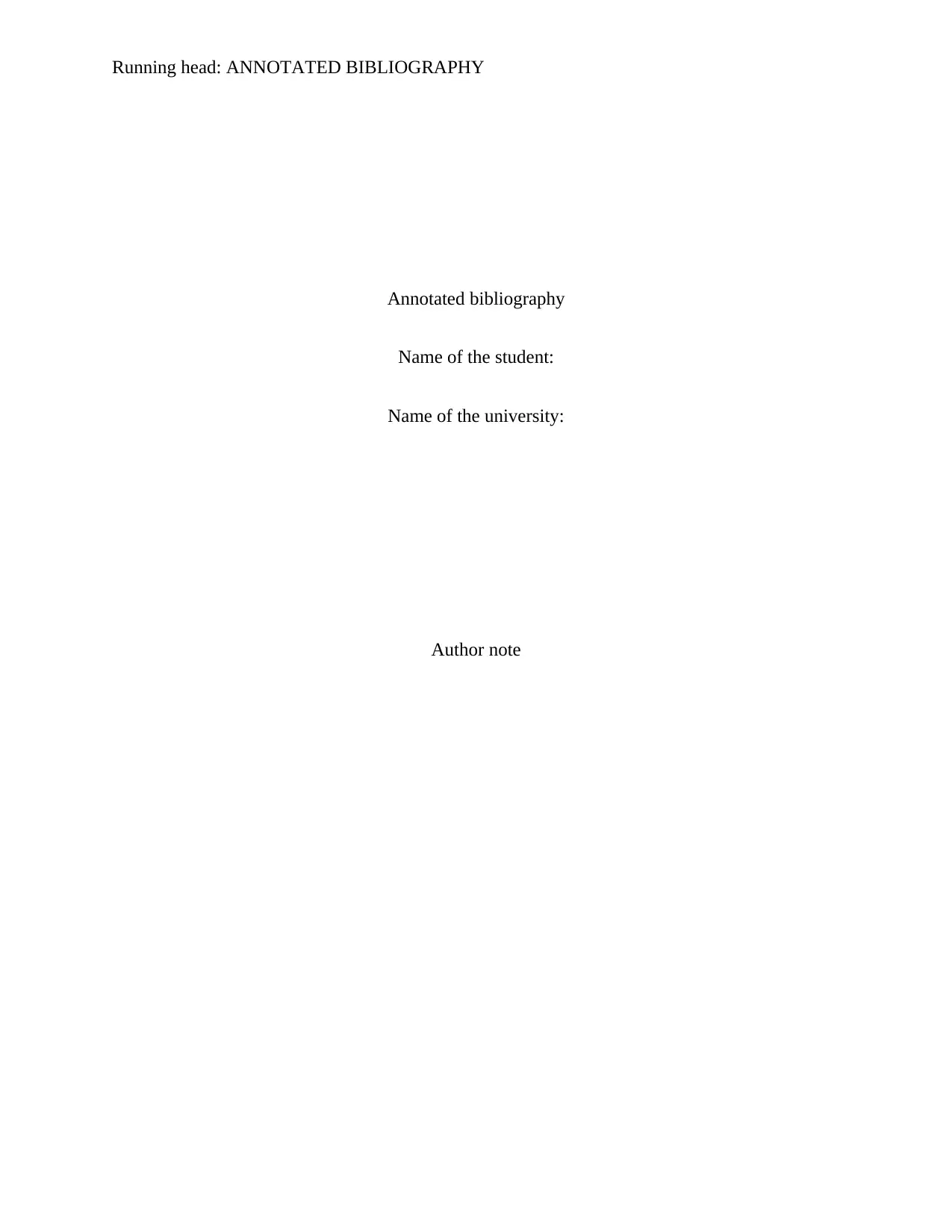
Running head: ANNOTATED BIBLIOGRAPHY
Annotated bibliography
Name of the student:
Name of the university:
Author note
Annotated bibliography
Name of the student:
Name of the university:
Author note
Paraphrase This Document
Need a fresh take? Get an instant paraphrase of this document with our AI Paraphraser
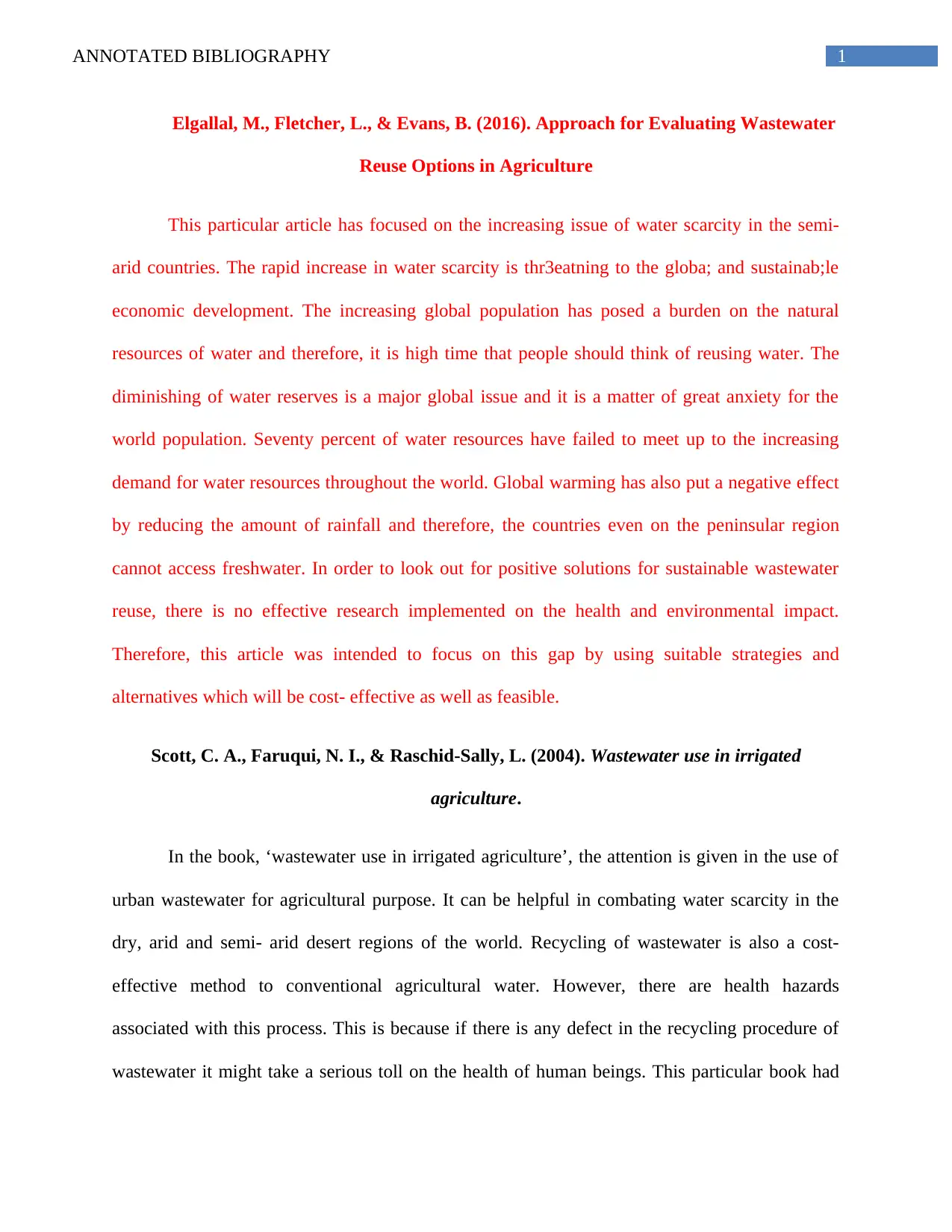
1ANNOTATED BIBLIOGRAPHY
Elgallal, M., Fletcher, L., & Evans, B. (2016). Approach for Evaluating Wastewater
Reuse Options in Agriculture
This particular article has focused on the increasing issue of water scarcity in the semi-
arid countries. The rapid increase in water scarcity is thr3eatning to the globa; and sustainab;le
economic development. The increasing global population has posed a burden on the natural
resources of water and therefore, it is high time that people should think of reusing water. The
diminishing of water reserves is a major global issue and it is a matter of great anxiety for the
world population. Seventy percent of water resources have failed to meet up to the increasing
demand for water resources throughout the world. Global warming has also put a negative effect
by reducing the amount of rainfall and therefore, the countries even on the peninsular region
cannot access freshwater. In order to look out for positive solutions for sustainable wastewater
reuse, there is no effective research implemented on the health and environmental impact.
Therefore, this article was intended to focus on this gap by using suitable strategies and
alternatives which will be cost- effective as well as feasible.
Scott, C. A., Faruqui, N. I., & Raschid-Sally, L. (2004). Wastewater use in irrigated
agriculture.
In the book, ‘wastewater use in irrigated agriculture’, the attention is given in the use of
urban wastewater for agricultural purpose. It can be helpful in combating water scarcity in the
dry, arid and semi- arid desert regions of the world. Recycling of wastewater is also a cost-
effective method to conventional agricultural water. However, there are health hazards
associated with this process. This is because if there is any defect in the recycling procedure of
wastewater it might take a serious toll on the health of human beings. This particular book had
Elgallal, M., Fletcher, L., & Evans, B. (2016). Approach for Evaluating Wastewater
Reuse Options in Agriculture
This particular article has focused on the increasing issue of water scarcity in the semi-
arid countries. The rapid increase in water scarcity is thr3eatning to the globa; and sustainab;le
economic development. The increasing global population has posed a burden on the natural
resources of water and therefore, it is high time that people should think of reusing water. The
diminishing of water reserves is a major global issue and it is a matter of great anxiety for the
world population. Seventy percent of water resources have failed to meet up to the increasing
demand for water resources throughout the world. Global warming has also put a negative effect
by reducing the amount of rainfall and therefore, the countries even on the peninsular region
cannot access freshwater. In order to look out for positive solutions for sustainable wastewater
reuse, there is no effective research implemented on the health and environmental impact.
Therefore, this article was intended to focus on this gap by using suitable strategies and
alternatives which will be cost- effective as well as feasible.
Scott, C. A., Faruqui, N. I., & Raschid-Sally, L. (2004). Wastewater use in irrigated
agriculture.
In the book, ‘wastewater use in irrigated agriculture’, the attention is given in the use of
urban wastewater for agricultural purpose. It can be helpful in combating water scarcity in the
dry, arid and semi- arid desert regions of the world. Recycling of wastewater is also a cost-
effective method to conventional agricultural water. However, there are health hazards
associated with this process. This is because if there is any defect in the recycling procedure of
wastewater it might take a serious toll on the health of human beings. This particular book had
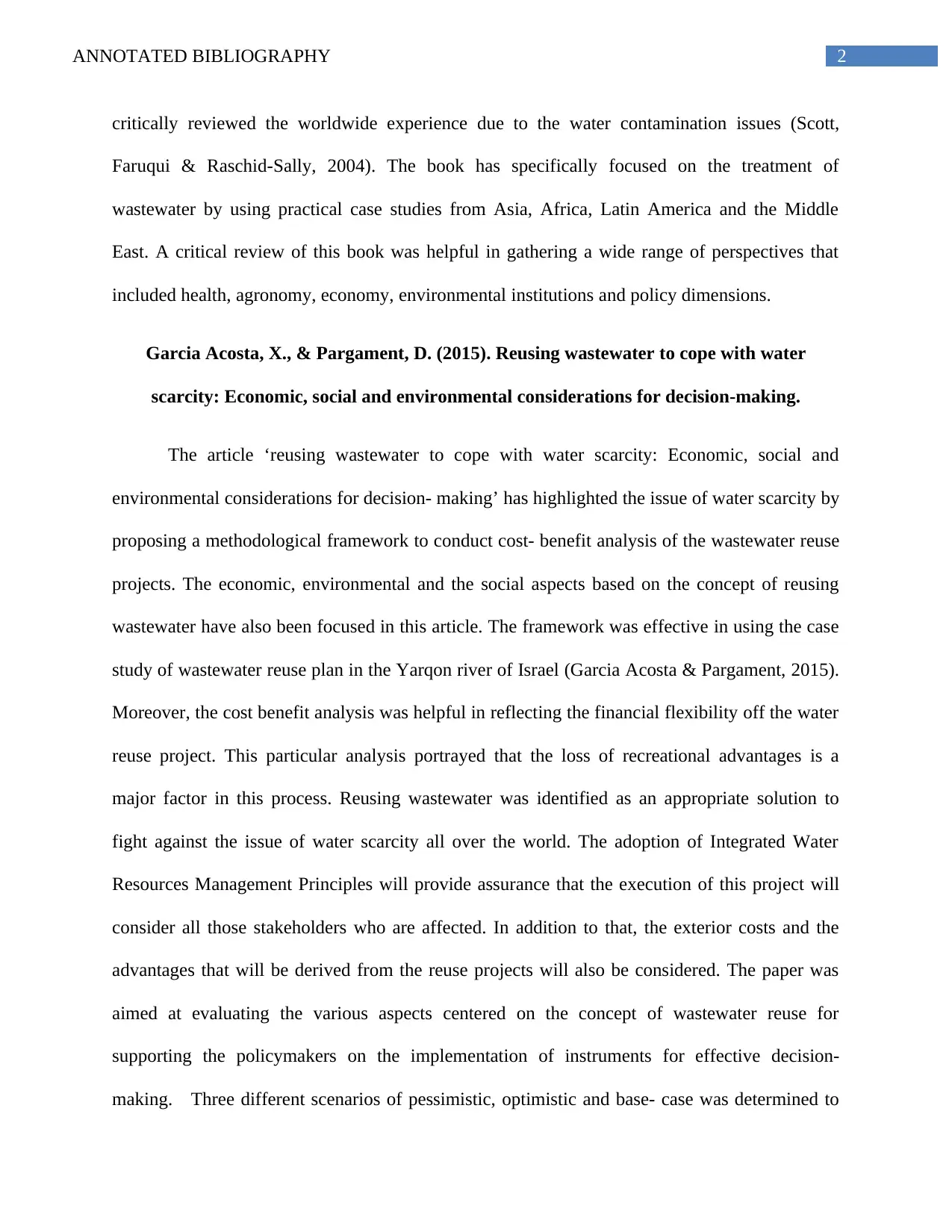
2ANNOTATED BIBLIOGRAPHY
critically reviewed the worldwide experience due to the water contamination issues (Scott,
Faruqui & Raschid-Sally, 2004). The book has specifically focused on the treatment of
wastewater by using practical case studies from Asia, Africa, Latin America and the Middle
East. A critical review of this book was helpful in gathering a wide range of perspectives that
included health, agronomy, economy, environmental institutions and policy dimensions.
Garcia Acosta, X., & Pargament, D. (2015). Reusing wastewater to cope with water
scarcity: Economic, social and environmental considerations for decision-making.
The article ‘reusing wastewater to cope with water scarcity: Economic, social and
environmental considerations for decision- making’ has highlighted the issue of water scarcity by
proposing a methodological framework to conduct cost- benefit analysis of the wastewater reuse
projects. The economic, environmental and the social aspects based on the concept of reusing
wastewater have also been focused in this article. The framework was effective in using the case
study of wastewater reuse plan in the Yarqon river of Israel (Garcia Acosta & Pargament, 2015).
Moreover, the cost benefit analysis was helpful in reflecting the financial flexibility off the water
reuse project. This particular analysis portrayed that the loss of recreational advantages is a
major factor in this process. Reusing wastewater was identified as an appropriate solution to
fight against the issue of water scarcity all over the world. The adoption of Integrated Water
Resources Management Principles will provide assurance that the execution of this project will
consider all those stakeholders who are affected. In addition to that, the exterior costs and the
advantages that will be derived from the reuse projects will also be considered. The paper was
aimed at evaluating the various aspects centered on the concept of wastewater reuse for
supporting the policymakers on the implementation of instruments for effective decision-
making. Three different scenarios of pessimistic, optimistic and base- case was determined to
critically reviewed the worldwide experience due to the water contamination issues (Scott,
Faruqui & Raschid-Sally, 2004). The book has specifically focused on the treatment of
wastewater by using practical case studies from Asia, Africa, Latin America and the Middle
East. A critical review of this book was helpful in gathering a wide range of perspectives that
included health, agronomy, economy, environmental institutions and policy dimensions.
Garcia Acosta, X., & Pargament, D. (2015). Reusing wastewater to cope with water
scarcity: Economic, social and environmental considerations for decision-making.
The article ‘reusing wastewater to cope with water scarcity: Economic, social and
environmental considerations for decision- making’ has highlighted the issue of water scarcity by
proposing a methodological framework to conduct cost- benefit analysis of the wastewater reuse
projects. The economic, environmental and the social aspects based on the concept of reusing
wastewater have also been focused in this article. The framework was effective in using the case
study of wastewater reuse plan in the Yarqon river of Israel (Garcia Acosta & Pargament, 2015).
Moreover, the cost benefit analysis was helpful in reflecting the financial flexibility off the water
reuse project. This particular analysis portrayed that the loss of recreational advantages is a
major factor in this process. Reusing wastewater was identified as an appropriate solution to
fight against the issue of water scarcity all over the world. The adoption of Integrated Water
Resources Management Principles will provide assurance that the execution of this project will
consider all those stakeholders who are affected. In addition to that, the exterior costs and the
advantages that will be derived from the reuse projects will also be considered. The paper was
aimed at evaluating the various aspects centered on the concept of wastewater reuse for
supporting the policymakers on the implementation of instruments for effective decision-
making. Three different scenarios of pessimistic, optimistic and base- case was determined to
⊘ This is a preview!⊘
Do you want full access?
Subscribe today to unlock all pages.

Trusted by 1+ million students worldwide
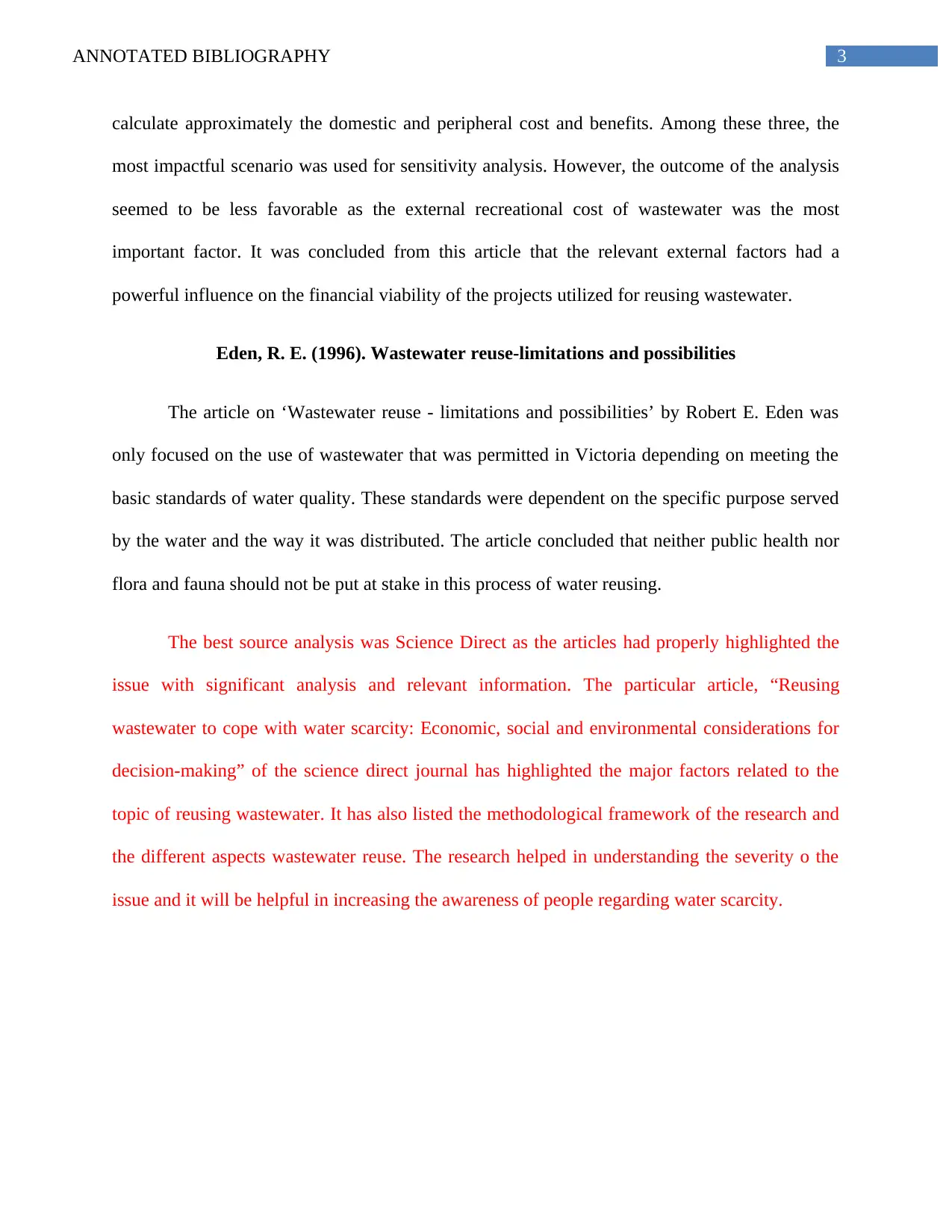
3ANNOTATED BIBLIOGRAPHY
calculate approximately the domestic and peripheral cost and benefits. Among these three, the
most impactful scenario was used for sensitivity analysis. However, the outcome of the analysis
seemed to be less favorable as the external recreational cost of wastewater was the most
important factor. It was concluded from this article that the relevant external factors had a
powerful influence on the financial viability of the projects utilized for reusing wastewater.
Eden, R. E. (1996). Wastewater reuse-limitations and possibilities
The article on ‘Wastewater reuse - limitations and possibilities’ by Robert E. Eden was
only focused on the use of wastewater that was permitted in Victoria depending on meeting the
basic standards of water quality. These standards were dependent on the specific purpose served
by the water and the way it was distributed. The article concluded that neither public health nor
flora and fauna should not be put at stake in this process of water reusing.
The best source analysis was Science Direct as the articles had properly highlighted the
issue with significant analysis and relevant information. The particular article, “Reusing
wastewater to cope with water scarcity: Economic, social and environmental considerations for
decision-making” of the science direct journal has highlighted the major factors related to the
topic of reusing wastewater. It has also listed the methodological framework of the research and
the different aspects wastewater reuse. The research helped in understanding the severity o the
issue and it will be helpful in increasing the awareness of people regarding water scarcity.
calculate approximately the domestic and peripheral cost and benefits. Among these three, the
most impactful scenario was used for sensitivity analysis. However, the outcome of the analysis
seemed to be less favorable as the external recreational cost of wastewater was the most
important factor. It was concluded from this article that the relevant external factors had a
powerful influence on the financial viability of the projects utilized for reusing wastewater.
Eden, R. E. (1996). Wastewater reuse-limitations and possibilities
The article on ‘Wastewater reuse - limitations and possibilities’ by Robert E. Eden was
only focused on the use of wastewater that was permitted in Victoria depending on meeting the
basic standards of water quality. These standards were dependent on the specific purpose served
by the water and the way it was distributed. The article concluded that neither public health nor
flora and fauna should not be put at stake in this process of water reusing.
The best source analysis was Science Direct as the articles had properly highlighted the
issue with significant analysis and relevant information. The particular article, “Reusing
wastewater to cope with water scarcity: Economic, social and environmental considerations for
decision-making” of the science direct journal has highlighted the major factors related to the
topic of reusing wastewater. It has also listed the methodological framework of the research and
the different aspects wastewater reuse. The research helped in understanding the severity o the
issue and it will be helpful in increasing the awareness of people regarding water scarcity.
Paraphrase This Document
Need a fresh take? Get an instant paraphrase of this document with our AI Paraphraser
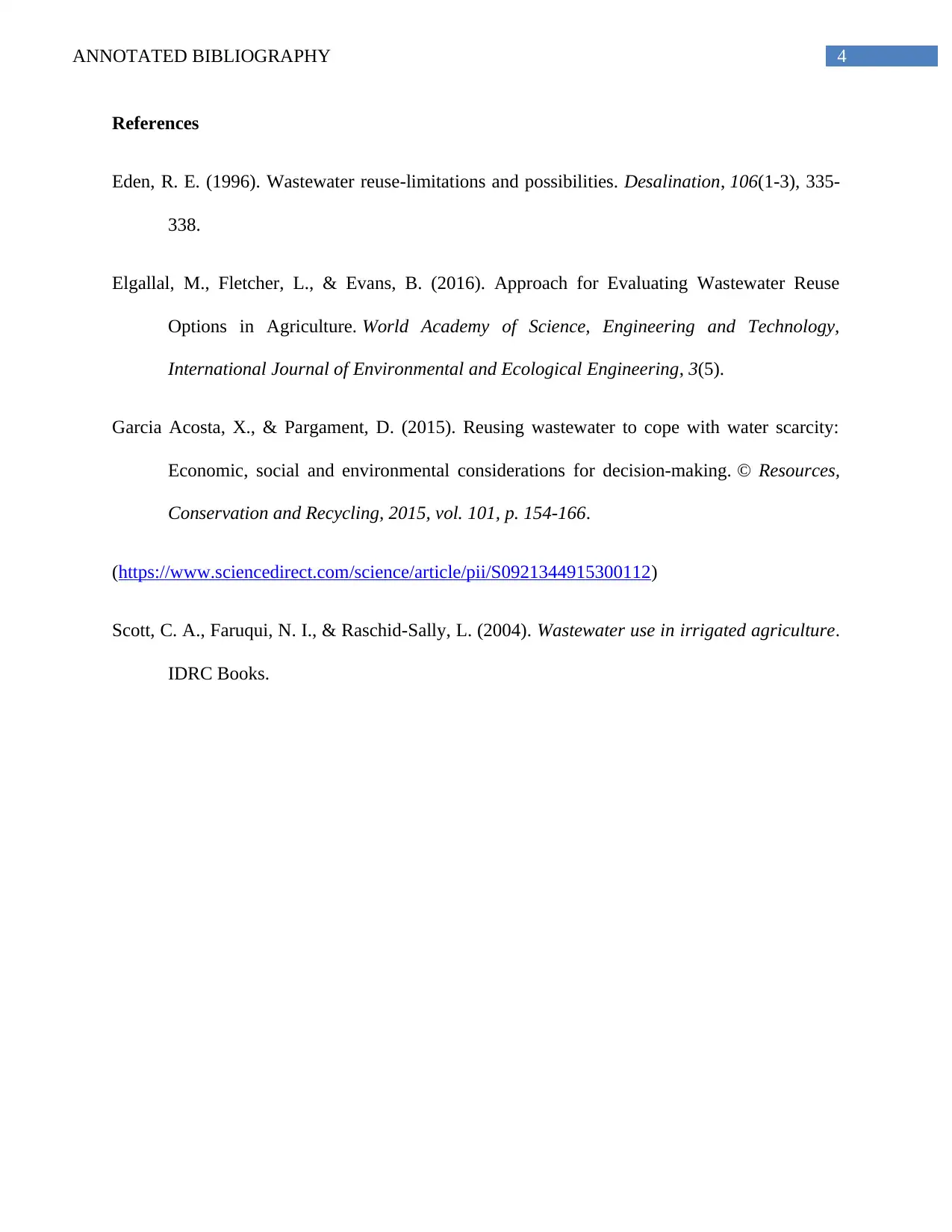
4ANNOTATED BIBLIOGRAPHY
References
Eden, R. E. (1996). Wastewater reuse-limitations and possibilities. Desalination, 106(1-3), 335-
338.
Elgallal, M., Fletcher, L., & Evans, B. (2016). Approach for Evaluating Wastewater Reuse
Options in Agriculture. World Academy of Science, Engineering and Technology,
International Journal of Environmental and Ecological Engineering, 3(5).
Garcia Acosta, X., & Pargament, D. (2015). Reusing wastewater to cope with water scarcity:
Economic, social and environmental considerations for decision-making. © Resources,
Conservation and Recycling, 2015, vol. 101, p. 154-166.
(https://www.sciencedirect.com/science/article/pii/S0921344915300112)
Scott, C. A., Faruqui, N. I., & Raschid-Sally, L. (2004). Wastewater use in irrigated agriculture.
IDRC Books.
References
Eden, R. E. (1996). Wastewater reuse-limitations and possibilities. Desalination, 106(1-3), 335-
338.
Elgallal, M., Fletcher, L., & Evans, B. (2016). Approach for Evaluating Wastewater Reuse
Options in Agriculture. World Academy of Science, Engineering and Technology,
International Journal of Environmental and Ecological Engineering, 3(5).
Garcia Acosta, X., & Pargament, D. (2015). Reusing wastewater to cope with water scarcity:
Economic, social and environmental considerations for decision-making. © Resources,
Conservation and Recycling, 2015, vol. 101, p. 154-166.
(https://www.sciencedirect.com/science/article/pii/S0921344915300112)
Scott, C. A., Faruqui, N. I., & Raschid-Sally, L. (2004). Wastewater use in irrigated agriculture.
IDRC Books.
1 out of 5
Your All-in-One AI-Powered Toolkit for Academic Success.
+13062052269
info@desklib.com
Available 24*7 on WhatsApp / Email
![[object Object]](/_next/static/media/star-bottom.7253800d.svg)
Unlock your academic potential
Copyright © 2020–2026 A2Z Services. All Rights Reserved. Developed and managed by ZUCOL.